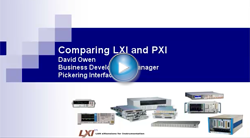LXI (LAN-based eXtensions for Instrumentation) is the latest evolution of communications for instrumentation in the Test & Measurement industry. Designed to provide consistent interoperability and synchronization, LXI takes the benefits of Ethernet and the experience of almost 40 years of Test & Measurement standards to create a standard that saves time in areas like integration, programming, and supporting unique applications.
LXI is the power of Ethernet and the Web applied to Test & Measurement (T&M) instruments, offering new possibilities in test systems – local, remote, distributed and time-aware.
The PCI eXtensions for Instrumentation (PXI) modular instrumentation architecture delivers a rugged, PC-based, and high-performance measurement and automation system.
With PXI you benefit from the low cost, performance, and flexibility of the latest PC technology and the benefits of an open industry standard. PXI combines standard PC technology from the CompactPCI specification with integrated timing and triggering.
PXI and LXI are Complimentary Solutions

The PXI and LXI Standards are actually quite different and complimentary to one another. LXI and PXI often coexist with one another in hybrid systems. Each standard offers unique benefits and test engineers should choose the platform that best meets their application and performance needs. PXI is a central processing model based on the PC, using relatively simple mechanically
defined instruments on a very high speed bus. LXI is a distributed system using intelligent instruments of any size communicating by a message based interface over a fast bus. LXI is similar to GPIB but provides more options.
Advantages of LXI
- Parametric performance - LXI has freedom of size and vendor specific conditioning to get the very best performance.
PXI is limited by module size and lack of inter-module specifications in a relatively unshielded environment.
- Supporting large components - LXI instruments have mechanical freedom and PXI implementations can be cumbersome and not very cost effective.
- Supporting large solutions - LXI has the advantage of space to implement large arrays of components as a single entity.
PXI modules have interconnection overheads and additional software complexity.
- Control at a distance - Based upon Ethernet, LXI can operate from anywhere in the world through standard IT networks.